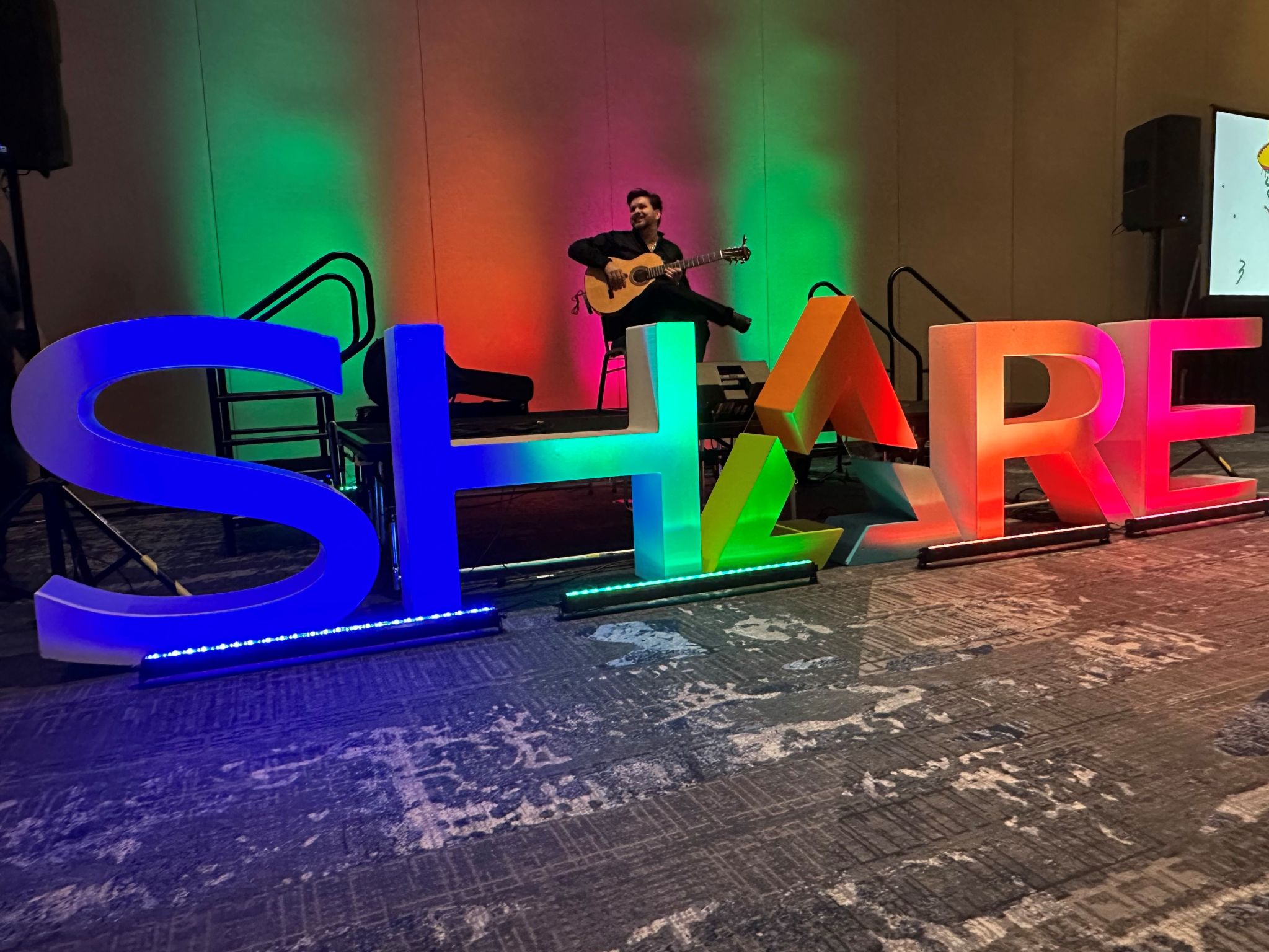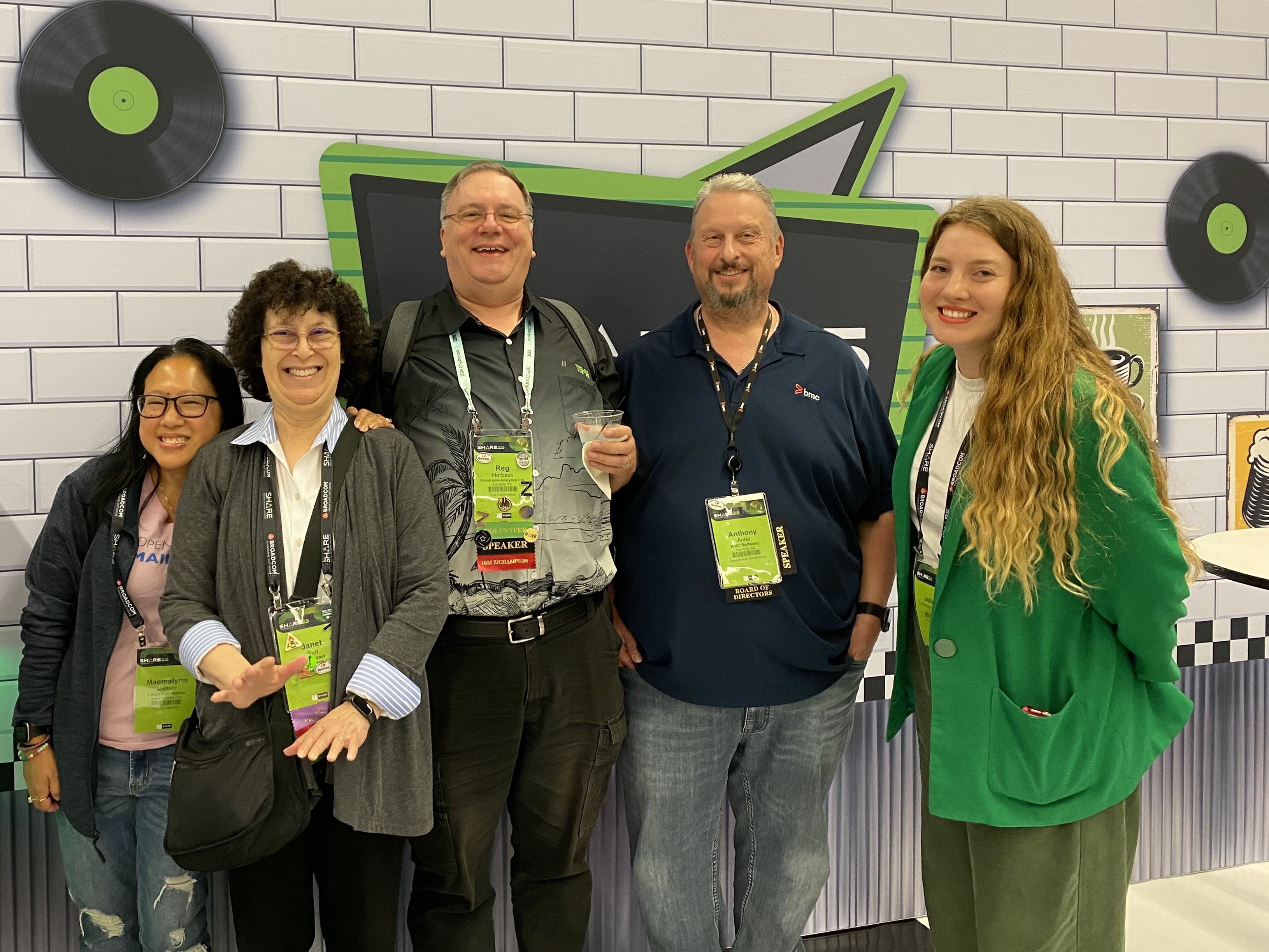It’s day one of sessions at SHARE Cleveland, and mainframers from across the globe have gathered for an energizing week of industry immersion. From deep dives on artificial intelligence (AI) agents to conversations about modernization and security, mainframers are ready to listen, learn, and share.
The SHARE’d Intelligence team is onsite, gathering insights from sessions and connecting with members to uncover what has resonated the most with our members. Here's a quick look at some of the highlights from Monday, Aug. 18, 2025.
After a morning lineup that opened with a general session and some high-voltage breakout sessions, our team plugged-in just in time to catch the midday rhythm. We dropped into two of the Lunch-and-Learn sessions hosted by SHARE partners — where the insights hit all of the right notes.

MSD 99.9 FM: All Mainframe. All Modern. All Week
We peeked into Broadcom’s session and heard from two of the company’s rockstars — Greg Lotko, senior vice president and general manager for Broadcom’s Mainframe Software Division, and Venkat Balabhadrapatruni, distinguished engineer at Broadcom — on how to approach AI with a business-first mindset. Lotko emphasized the importance of grounding AI in business value, preparing yourself and your team (especially around security), and continuously educating staff on AI’s capabilities — all while keeping human oversight front and center. Venkat explored the rising relevance of AI agents: digital counterparts that, like any team member, require thoughtful onboarding and strong security protocols.
Additional takeaways included:
- The critical role of secure data in enabling responsible AI. Modernization efforts also help reinforce mainframe security.
- The growing accessibility of coding — while “vibe coding” may not be mainstream on the mainframe yet, Venkat shared how his college-aged son built a website using AI-assisted coding tools, showcasing how more people are exploring coding.
- The importance of choosing the right AI tools. Broadcom’s support for open source and compatibility with any large language models (LLMs) is enabled by its MCP (Model Context Protocol) architecture.
The Opening Act: Rock-Solid Resilience — GenAI Knowledge & Cyber Protection for the Modern Mainframe
We hopped over to another Lunch-and-Learn session, sponsored by BMC, that featured a panel discussion with Liat Sokolov, senior manager in product management, Anthony DiStauro, a distinguished engineer, and Ken Chism, director of world wide cybersecurity sales. AI agents came up again, with the audience question, “Should we view AI agents as someone new to the field, or as someone with 30 years of experience?” According to the panelists, for now, AI agents should be treated like junior developers — capable but still requiring oversight. As the technology matures, trust may grow, but keeping a human in the loop remains essential.
Chism then shared what currently has him feeling “paranoid” on the mainframe — primarily security. He referenced recent cases where scammers with ties to North Korea, posing as employees, were discovered operating large server setups from their homes. He emphasized the added risk that comes with contractors compared to internal staff, especially in environments with thousands of users. Machine learning, he noted, could help mitigate the risk by identifying abnormal behavior patterns that might signal a threat.
AMP-Up Talent Succession Planning — Build Resilience Into the Next Gen
Next up was an afternoon with one successful act after the next. We began with a session on succession planning, which remains a critical topic, especially as many mainframers approach retirement. Presenters Dave Bond, principal client services management at Broadcom, Senthil Sivakumar Govindarajan from Bank of America, and Hunter Johnson, product marketing engineer for Beyond Code at Broadcom, shared findings from CCS Insights Succession Playbook Research, asking questions such as, “Why do so many mainframe teams rely on just one person for critical system knowledge?”
They outlined five interconnected principles for effective succession planning:
- Redundancy: Assign at least two people per domain, with regular rotation to encourage mentoring and shared ownership.
- Documentation: Use code comments and walk-throughs to make knowledge accessible and transferable.
- Mobility: Encourage cross-team rotation and open project ownership. Technicians can volunteer to shadow other groups without changing roles entirely.
- Metrics: Track knowledge coverage, retention, and conversations in measurable ways.
- Governance: Define roles clearly, conduct regular reviews, and foster collaboration between IT and human resources. Assign a talent lead with real accountability.
The session attendees were engaged, with the session’s conversational structure. Many shared how their teams are navigating succession planning:
- One team is modernizing, integrating AI tooling and aligning CI/CD pipelines with the skills of newer hires.
- One attendee on the systems side shared how they have advocated for hiring ahead of retirements, even though this means temporarily increasing headcount, as training can take as long as three to five years.
- A new-to-the-mainframe attendee shared how knowledge-sharing is available at all levels of their organization, with new team members being able to ask peers for support.
Dispelling the Myths Around Open Source on the Mainframe
In celebration of the Open Mainframe Project’s 10th anniversary, John Mertic, executive director of Open Mainframe Project and director of program management at the Linux Foundation, led a session exploring how organizations can get started with open source — and why it’s a strategic opportunity for the mainframe community.
He highlighted the broader open-source ecosystem, noting that the Linux Foundation hosts over 1,500 projects spanning cloud computing, AI, web development, data systems, and more. Key benefits of open source include:
- Neutrality: Unlike projects owned by a single company (e.g., Elastic Search), the Open Mainframe Project ensures transparency and community-driven development.
- IP Clarity: Contributors retain their intellectual property, fostering trust and openness.
- Open Governance: A “do-ocracy” model allows contributors to shape projects through active participation, with decisions made transparently across teams.
Mertic emphasized that open source is not just about technology but collaboration. The Open Mainframe Project includes representatives from multiple organizations recognizing that shared infrastructure can be a competitive advantage.
He also shared examples of open-source efforts with deep mainframe roots:
- CBT Tape, a long-standing repository of community-contributed tools, joined the project in 2020 (for more information, read this article on SHARE’d Intelligence).
- The Mainframe Modernization Working Group is helping define and drive practical modernization strategies.
Beyond technology, the project is committed to diversity and inclusion, with initiatives like a podcast series that explores what it means to be a mainframer today.
The session closed with a reminder: anyone can contribute.
SHARE Technology Expo

Caption: SHARE'd Intelligence Editorial Advisory Committee (left to right): Maemalynn Meanor, Janet Sun, Reg Harbeck, Tony Anter, and Juliana Ludema McPherron
The SHARE Technology Expo can’t be missed, and SHARE’s Editorial Advisory Committee, the brains behind SHARE’d Intelligence, took the opportunity to meet up, connect, and snap a photo at the SHARE booth. We met with friends old and new at the Expo, and hope you did, too! If you see us, please say, ‘Hi,’ and share what your favorite learning opportunity has been so far.
Stay tuned for the next recap tomorrow!
Want more technical education? Become a member today!